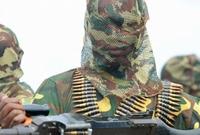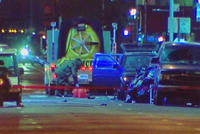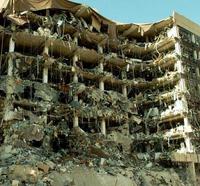-
Homegrown terrorists share characteristics, backgrounds
Since the 9/11 attacks, 90 people were arrested in the United States on terrorism charges for plots or attacks against the United States; a new study of the group finds that 44 percent had prior criminal records; 61 percent of the terrorism defendants attended some college, including three who earned doctoral degrees; 64 percent of those college-educated terrorism suspects were engineering majors
-
-
Al Qaeda aiming at soft targets in U.S.
DHS has ramped up its efforts to protect soft targets in the United States from terrorist attack this year; the department has issued bulletins to state and local law enforcement warning of the possibility terrorists could target religious gatherings, sports matches, and parades; the al Qaeda affiliate in Yemen puts out an online magazine in English that encourages U.S. residents to plan attacks. Suggestions include driving a truck into a crowded place or shooting into a restaurant
-
-
U.S. terror watch list streamlined, updated instantaneously

Now a single tip about a terror link will be enough for inclusion in the watch list for U.S. security officials, who have also evolved a quicker system to share the database of potential terrorists among screening agencies; a senior U.S. counter-terrorism official said that officials have now “effectively in a broad stroke lowered the bar for inclusion” in the list; the new criteria have led to only modest growth in the list, which stands at 440,000 people, about 5 percent more than last year; also, instead of sending data once a night to the Terrorist Screening Center’s watch list, which can take hours, the new system should be able to update the watch list almost instantly as names are entered
-
-
Terrorists' lone-wolf approach changes U.S. strategy
The year which coming to an end saw several terror plots in the United States foiled; these plots had two things in common: They were launched by lone-wolf attackers, and the FBI was in the middle of them; experts say to expect more undercover cases in 2011, because the FBI has clearly decided that the best way to battle the growing threat of homegrown terrorism in this country is to confront the suspects directly
-
-
Pirates winning war off Somali coast

The hugely expensive effort against the Somali pirates — a fleet of 40 warships from 30 countries is patrolling the waters near Somalia — has failed to slow down the rate of piracy; Somali attacks had soared dramatically in the past three years — from 40 attacks in 2007 to a reported 218 attacks last year; the Somali buccaneers are roaming over a much bigger territory and causing greater damage; the average ransom payment to the Somalis has doubled to $5 million; they are holding their hostages for up to 120 days — twice as long as in the past; they even used a hijacked freighter to attack a naval warship that was escorting supplies for African peacekeepers; the increasingly brazen pirates are currently holding 26 vessels and 609 hostages off the coast of Somalia; there is growing evidence that Somalia’s Islamic militants, including the feared al-Shabab radical group, are beginning to use piracy to raise money for their relentless rebellion against Somalia’s government
-
-
Closing of U.K. forensics research centers triggers protest
The U.K. government announced that the Forensic Science Service — a leading research center based in Birmingham, United Kingdom — will be closed by 2012 because of budgetary reasons; law enforcement leaders and scientists calls on the government to reconsider the decision, saying that “The reputation of forensic science in the U.K. will undoubtedly diminish —- The lack of research means that we will be lagging behind the rest of the world, and justice will suffer”
-
-
Former Guyana politician sentenced in JFK terror plot
Abdul Kadir, a former member of Guyana’s parliament, was sentenced to life in prison for participating in a plot to blow up the jet fuel supply tank system at JFK airport; the two other plotters are also of Guyanese origin: one, a former baggage handler at JFK, will be sentenced in late January; the other, Adnam Shukrijumah, has now been promoted to chief of al Qaeda’s global operations
-
-
Radical Islamist group kills 3 hospital employees in fresh Nigeria attack
A radical Islamist sect which has claimed responsibility for Christmas Eve bombings of Nigerian churches is behind the killing of three more people at a hospital, police said on Wednesday; the Boko Haram group — the name means “Western education is sinful” in the Hausa language spoken across northern Nigeria — is loosely modeled on the Taliban movement in Afghanistan; it demands the introduction of Islamic law across Nigeria
-
-
Islamic terrorism spreads in Nigeria

Nigeria, with a population of 150 million, is the most populous country in Africa, the eighth most populous country in the world, and the most populous country in the world in which the majority of the population is black; Nigeria’s population is almost evenly split between Muslims in the north and the predominantly Christian south; radical Islamic groups have increased their influence in the north by attacking law enforcement units and killing politicians, civil servants, teachers, and others who, according to the Islamists, stand in the way of the imposition of Sharia law in the north; in the past few years these groups have been pushing south, extending their terror campaign to central Nigeria, in the nation’s “middle belt,” where dozens of ethnic groups vie for control of fertile lands.
-
-
Pentagon revamps security in wake of Wikileaks
There are 2.2 million people in the United States with access to one or more levels (confidential, secret, and top secret) of classified information; there are 854,000 people with top secret clearances — of which 265,000 are contractors; the 9/11 Commission recommended more sharing of information among agencies — but critics say that too much sharing is as risky as too little sharing
-
-
Government secrecy harder to maintain in the Internet age
Among the likely consequences of WikiLeaks: threats of prosecution under the Espionage Act; proposed legislation that would make it illegal to publish the names of military or intelligence community informants; increased use of subpoena power to compel journalists to disclose confidential sources; the mainstream media, already experiencing an ongoing financial crisis, may be dissuaded from starting and continuing the long and expensive battle to obtain information that officials want to keep secret
-
-
Germany reports "sharp rise" in China-originated cyberattacks
Germany detected a sharp rise in serious cyberattacks in 2010; in the first nine months of 2010 there were some 1,600 such attacks recorded, compared to around 900 for the whole of 2009, plus most likely a considerable number that went undetected; Interior Ministry spokesman: “Germany is a very high-tech country with considerable experience and know-how, so of course others will naturally try to get hold of this knowledge—- China is playing a large role in this”
-
-
Paraglider unit gives police an eye in the sky
Palm Bay, Florida police has a 4-man paraglider unit which has been operating for a year and a half, taking to the air to provide a bird’s-eye view of crime scenes while aiding in the search for everything from marijuana fields to possible arsonists
-
-
White House: U.S. "in much better position" on terrorism

The White House sought to reassure the traveling public that it has fixed security lapses that led to the foiled bomb attack aboard a U.S.-bound jetliner last Christmas; John Brennan, the president’s chief counterterrorism and homeland security adviser, said the country’s security infrastructure has improved since Nigerian-born Umar Farouk Abdulmutallab smuggled explosives hidden in his underwear onto an airplane headed for Detroit; Brennan: “What we have seen recently is increased focus, I think, on the part of terrorist groups to try to carry out some of these smaller-scale attacks…. And so we are staying very focused on our ability to detect those types of attacks and stop them whether or not they’re by individuals or part of a larger, organizational effort”
-
-
Holder: threat of homegrown terrorism "keeps me up at night"

U.S. attorney general Eric Holder says the danger of homegrown terror “keeps me up at night”: “The threat has changed from simply worrying about foreigners coming here, to worrying about people in the United States, American citizens — raised here, born here, and who for whatever reason, have decided that they are going to become radicalized and take up arms against the nation in which they were born”; the attorney general said that of 126 people who have been charged with allegations related to terrorism in the past 24 months, 50 had been American citizens; Holder dismissed criticism of recent FBI sting operations, which some have argued employed the use of illegal “entrapment,” offering that “options are always given all along the way for them to say, ‘You know what, I have changed my mind. I don’t want to do it’”
-
More headlines
The long view
Factories First: Winning the Drone War Before It Starts
Wars are won by factories before they are won on the battlefield,Martin C. Feldmann writes, noting that the United States lacks the manufacturing depth for the coming drone age. Rectifying this situation “will take far more than procurement tweaks,” Feldmann writes. “It demands a national-level, wartime-scale industrial mobilization.”
No Nation Is an Island: The Dangers of Modern U.S. Isolationism
The resurgence of isolationist sentiment in American politics is understandable but misguided. While the desire to refocus on domestic renewal is justified, retreating from the world will not bring the security, prosperity, or sovereignty that its proponents promise. On the contrary, it invites instability, diminishes U.S. influence, and erodes the democratic order the U.S. helped forge.
Fragmented by Design: USAID’s Dismantling and the Future of American Foreign Aid
The Trump administration launched an aggressive restructuring of U.S. foreign aid, effectively dismantling the United States Agency for International Development (USAID). The humanitarian and geopolitical fallout of the demise of USAID includes shuttered clinics, destroyed food aid, and China’s growing influence in the global south. This new era of American soft power will determine how, and whether, the U.S. continues to lead in global development.
Water Wars: A Historic Agreement Between Mexico and US Is Ramping Up Border Tension
As climate change drives rising temperatures and changes in rainfall, Mexico and the US are in the middle of a conflict over water, putting an additional strain on their relationship. Partly due to constant droughts, Mexico has struggled to maintain its water deliveries for much of the last 25 years, deliveries to which it is obligated by a 1944 water-sharing agreement between the two countries.
How Disastrous Was the Trump-Putin Meeting?
In Alaska, Trump got played by Putin. Therefore, Steven Pifer writes, the European leaders and Zelensky have to “diplomatically offer suggestions to walk Trump back from a position that he does not appear to understand would be bad for Ukraine, bad for Europe, and bad for American interests. And they have to do so without setting off an explosion that could disrupt U.S.-Ukrainian and U.S.-European relations—all to the delight of Putin and the Kremlin.”
How Male Grievance Fuels Radicalization and Extremist Violence
Social extremism is evolving in reach and form. While traditional racial supremacy ideologies remain, contemporary movements are now often fueled by something more personal and emotionally resonant: male grievance.
